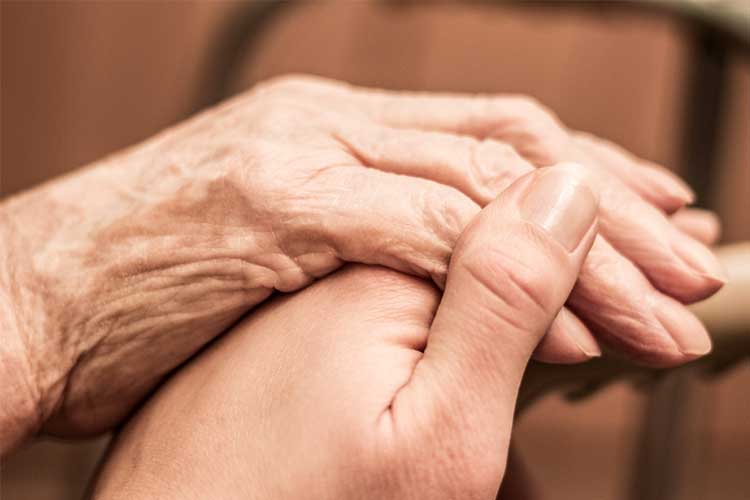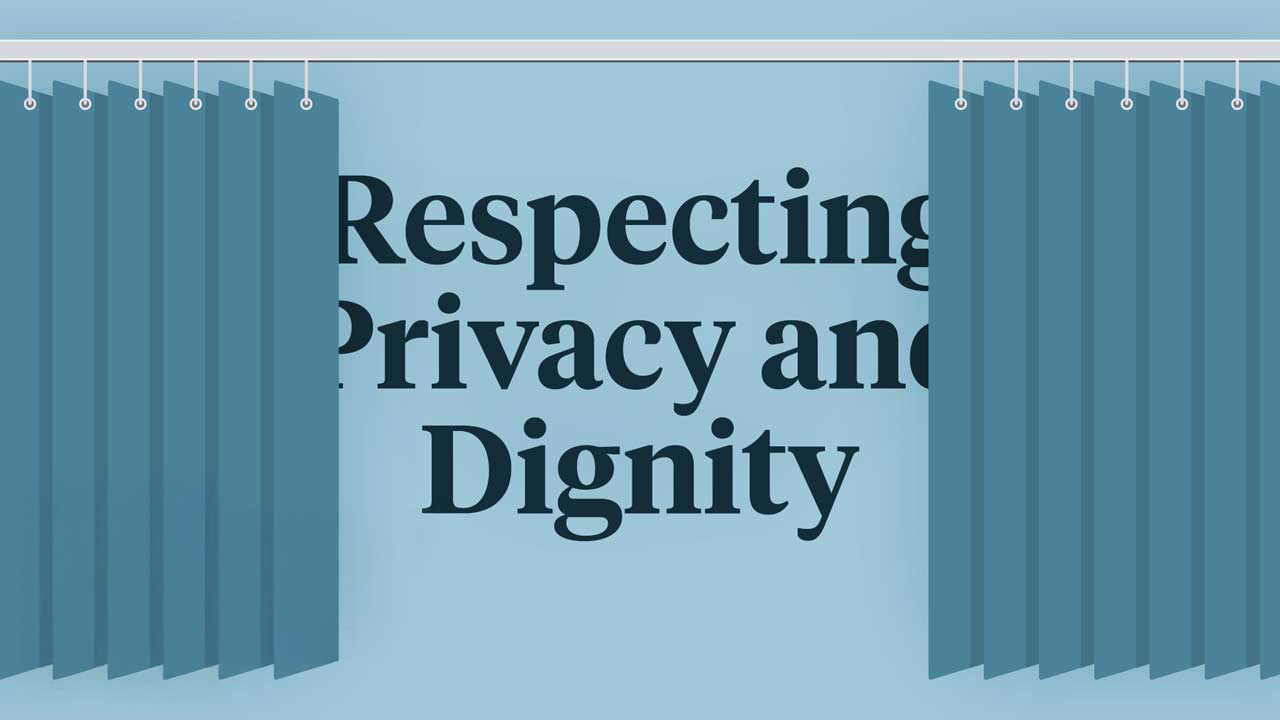Healthcare workers are bound by law to keep the medical records and health information of patients, clients and residents safe and private.
There is an inherent vulnerability in seeking healthcare and accessing aged care. A visit to a clinic can involve removing clothing, being prodded, scanned and possibly photographed. In aged care, it might mean having another person undress, wash and/or shower you.
Through all of this, the client trusts that the care worker, nurse, doctor and other healthcare staff have their privacy and dignity in mind. Any breach of this privacy will justifiably upset the client and could result in them taking legal action against you and/or the facility.
Personal Privacy Under the Strengthened Aged Care Quality Standards
Privacy and dignity are important considerations under the strengthened Aged Care Quality Standards.
Standard 1: The Person - Outcome 1.2: Dignity, respect and privacy (Action 1.2.4) requires staff to respect older people’s personal privacy. This includes intimate personal care activities, which should be performed sensitively and privately how and when the older person wishes (ACQSC 2024a).
Standard 7: The Residential Community - Outcome 7.1: Daily living highlights the importance of older people’s right to privacy in residential care settings:
- Action 7.1.4 states that older people have the right to decide who can enter their room and when
- Action 7.1.5 states that older people have the right to entertain visitors in private.
(ACQSC 2024b)
Older people’s personal privacy should be respected by:
- Allowing older people to decide who can enter their room and when
- Allowing older people to entertain visitors in private
- Supporting an older person’s right to privacy if they share a room
- Supporting older people to maintain relationships of their choice, including sexual and intimate activities
- Providing feedback to management about how older people’s privacy can be improved.
(ACQSC 2024b)
What Classifies as Health Information?
Health information is any information regarding a person’s health or disability and any information that relates to a health service they have received or will receive (Better Health Channel 2015).

Consent
When a client goes into a healthcare facility, they can make the decision to give staff access to their health records or to withhold them.
They do not have to, but giving healthcare staff their consent to access this information will help staff to provide the best care possible for them. Healthcare workers are required to protect clients’ privacy and confidentiality (Better Health Channel 2015).
Note: A person always maintains a right to access their own medical records.
Are There Exemptions to These Laws?
There are two situations in which a health service may use or share health information without consent. These are:
- When a person’s health or safety is seriously threatened and their health information will help - for example, if they are unconscious and the paramedics, doctors and nurses need to know if they are allergic to any medicines.
- When the information will limit or prevent a serious threat to public health or safety - for instance, if they have a severe contagious illness the public should be warned about.
(Better Health Channel 2015; Health.vic 2015)
Laws may differ by state, and there are certain exemptions that may apply in law enforcement situations and in a court of law. Remember that health information privacy laws only apply rights to living people (Better Health Channel 2015).
Privacy of Information Under the Strengthened Aged Care Quality Standards
Standard 2: The Residential Organisation - Outcome 2.7: Information management (Action 2.7.1) requires providers to implement a secure information management system.
Action 2.7.2 requires providers to gain informed consent from older people before collecting, using, storing and disclosing their information. This information must be managed in accordance with relevant privacy legislation. Furthermore, older people should be informed of their right to access or correct their information or withdraw consent to share it (ACQSC 2024c).

Person-centred Care
Privacy and dignity are guiding principles of person-centred care. The provision of effective, person-centred care hinges upon the following:
- Clear respect for the client’s values, preferences, and expressed needs
- Coordination and integration of care
- Information, communication, and education
- Physical comfort
- Emotional support and attempts to alleviate fear and anxiety
- Involvement of family, friends, and carers
- Transition and continuity
- Access to care.
(SA Health 2014)

Client Dignity
Even the smallest details in your interactions with clients during their time of vulnerability will impact their perception of how you regard them.
Beyond communication, be mindful of the steps you take to ensure the person’s privacy and modesty are protected, e.g., closing screens, making sure the client is covered, and keeping your voice level down when discussing private and personal issues (Skills for Care 2018). In aged care, this means carrying out personal care tasks, such as bathing, dressing, and feeding, with sensitivity.
Respect for the Values and Preferences of Your Client
Ways to let the client know that their preferences matter include:
- Ensuring gender accommodation is available, or when not possible, providing clients with support and safety needs in a mixed-gender environment
- Introducing yourself and explaining your role to the client
- Asking the client what name they prefer to be called
- Identifying people such as carers, family, or friends, in conjunction with the client
- Showing an awareness of the client’s views, beliefs, culture, and language
- Considering the client’s preferences in all decision-making and goal-setting for care and treatment
- Treating clients in an environment that is person-centred and focused on them as an individual
- Ensuring clients are treated with dignity and respect and showing sensitivity towards their cultural values and needs
- Keeping clients informed regarding their medical condition and involving the client, their family, and/or carer in decision-making
- Maintaining the client’s privacy during consultation and treatment by ensuring that curtains, doors, and window blinds are closed
- Respecting the client’s religious or faith traditions and ensuring that interpreters and cultural, religious, or faith supports are available if needed
(SA Health 2014)
An easy way to demonstrate to clients that their privacy and dignity are important to you is to involve them as much as possible in discussions regarding their treatment.
- Explain their daily plan of care
- Use plain language and try to avoid medical jargon
- Check that clients understand the information
- Ensure that clients know and completely understand their rights
- Respond to clients’ questions, requests, concerns, and complaints promptly
- Use bed boards to help clients identify staff and their goals.
(SA Health 2014)
Conclusion
Clients and residents deserve to be treated with the utmost dignity and respect during and following the treatment process. Keep in mind that breaching privacy laws could have devastating implications on the lives of you and your client, and on your career.
Test Your Knowledge
Question 1 of 3
Complete the following sentence: Clients are allowed access to their health information ...
Topics
References
- Aged Care Quality and Safety Commission 2024a, Standard 1: The Individual, Australian Government, viewed 27 March 2024, https://www.health.gov.au/resources/publications/strengthened-aged-care-quality-standards-august-2025?language=en
- Aged Care Quality and Safety Commission 2024b, Standard 7: The Residential Community, Australian Government, viewed 27 March 2024, https://www.health.gov.au/resources/publications/strengthened-aged-care-quality-standards-august-2025?language=en/residential-community
- Aged Care Quality and Safety Commission 2024c, Standard 2: The Organisation, Australian Government, viewed 27 March 2024, https://www.health.gov.au/resources/publications/strengthened-aged-care-quality-standards-august-2025?language=en
- Better Health Channel 2015, Confidentiality and Privacy in Healthcare, Victoria State Government, viewed 27 March 2024, https://www.betterhealth.vic.gov.au/health/ServicesAndSupport/confidentiality-and-privacy-in-healthcare
- Health.vic 2015, Protecting Patient Privacy in Victoria, Victoria State Government, viewed 27 March 2024, https://www.health.vic.gov.au/infectious-diseases/protecting-patient-privacy-in-victoria
- SA Health 2014, Staff Information on Respecting Patients’ Privacy and Dignity with Patient Centred Care Principles, Government of South Australia, viewed 27 March 2024, https://www.sahealth.sa.gov.au/wps/wcm/connect/c4293b0045d64eb58290ca574adac1f8/3b_Staff+Info_Respect+patient+privacy_PCC_App2.pdf?MOD=AJPERES&CACHEID=ROOTWORKSPACE-c4293b0045d64eb58290ca574adac1f8-mMAq8qj
- Skills for Care 2018, Standard 7: Privacy and Dignity, Department of Health and Social Care, viewed 27 March 2024, https://www.skillsforhealth.org.uk/wp-content/uploads/2021/01/Standard-7-Privacy-and-dignity.pdf
 New
New 
